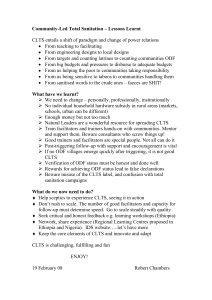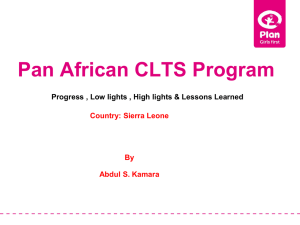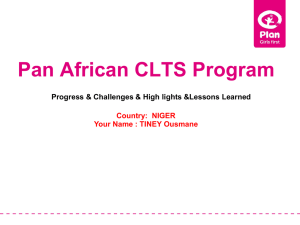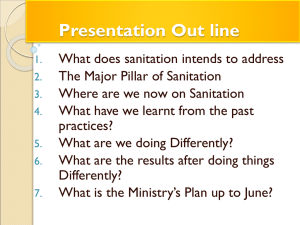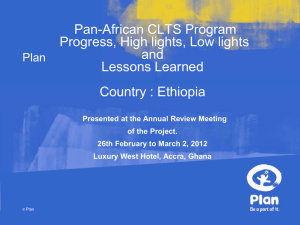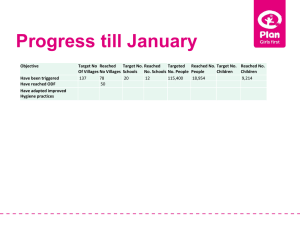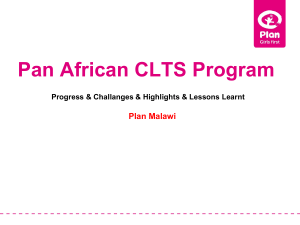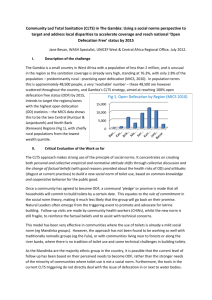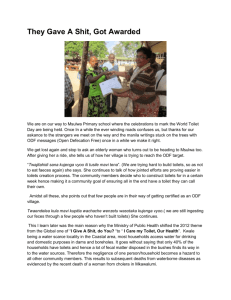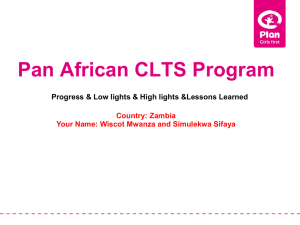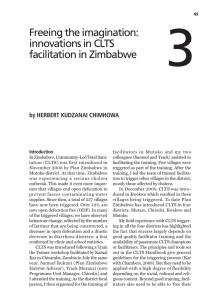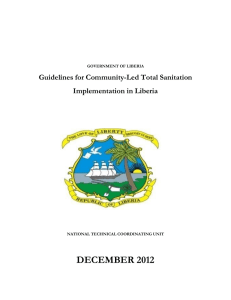This checklist is a practical tool for those who plan and implement
advertisement
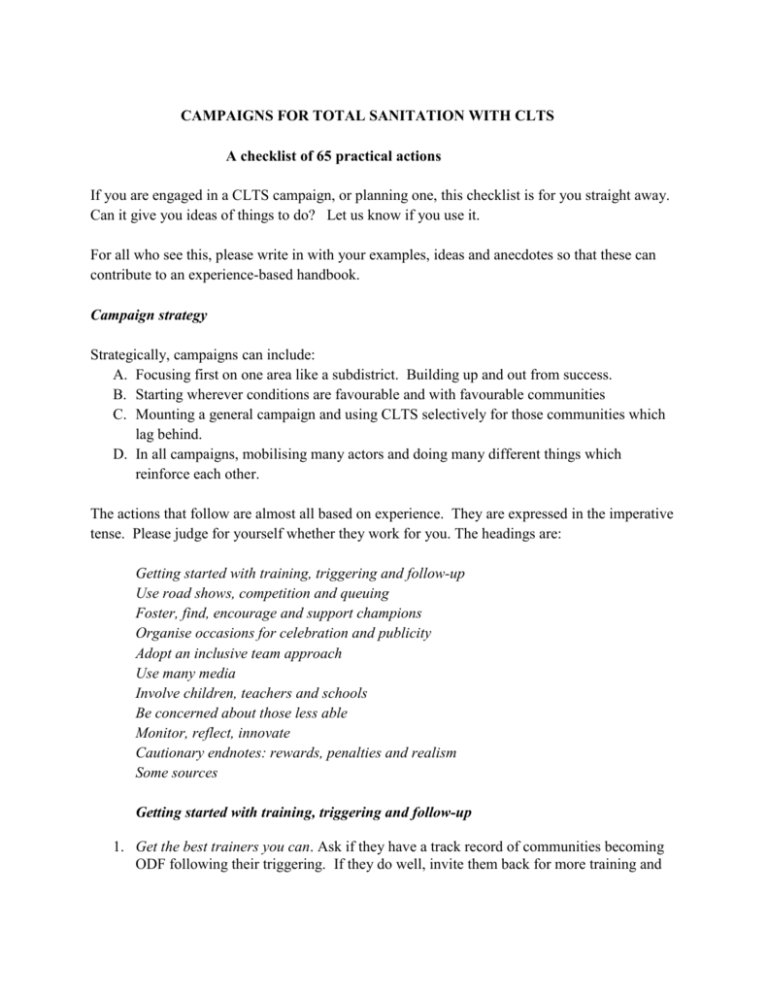
CAMPAIGNS FOR TOTAL SANITATION WITH CLTS A checklist of 65 practical actions If you are engaged in a CLTS campaign, or planning one, this checklist is for you straight away. Can it give you ideas of things to do? Let us know if you use it. For all who see this, please write in with your examples, ideas and anecdotes so that these can contribute to an experience-based handbook. Campaign strategy Strategically, campaigns can include: A. Focusing first on one area like a subdistrict. Building up and out from success. B. Starting wherever conditions are favourable and with favourable communities C. Mounting a general campaign and using CLTS selectively for those communities which lag behind. D. In all campaigns, mobilising many actors and doing many different things which reinforce each other. The actions that follow are almost all based on experience. They are expressed in the imperative tense. Please judge for yourself whether they work for you. The headings are: Getting started with training, triggering and follow-up Use road shows, competition and queuing Foster, find, encourage and support champions Organise occasions for celebration and publicity Adopt an inclusive team approach Use many media Involve children, teachers and schools Be concerned about those less able Monitor, reflect, innovate Cautionary endnotes: rewards, penalties and realism Some sources Getting started with training, triggering and follow-up 1. Get the best trainers you can. Ask if they have a track record of communities becoming ODF following their triggering. If they do well, invite them back for more training and mentoring. Note: the most recognised trainers may not be available. There will be others. Delay has costs. 2. Ensure that training is hands-on in real time in communities 3. Select for training people who are a. likely to be able to spend much of their time on triggering communities and training others, and b. personally seriously playful [not everyone can trigger well – those who can act, joke, sing, dance, play may be best] 4. Find out from the trainers who of the trainees are most promising, and find ways for them to be released and supported for CLTS 5. Build up a cadre of capable trainers and people who can trigger 6. Start CLTS with communities with favourable conditions 7. Concentrate triggering at a good time of year (often after rains and harvest) 8. Plan follow-up after triggering and aim for the first communities to have made themselves ODF in a few months 9. Verify ODF status thoroughly and credibly in these first communities 10. Help the first communities ODF to organise big celebrations with wide political and media coverage 11. Use these first communities as examples to show to other communities and to influential people Use roadshows, competition and queuing 12. Organise travelling roadshows with champions like Natural Leaders, political leaders, films, theatre and displays and invite local government and community leaders 13. Invite local governments and communities to make written requests for CLTS. Meet these on a first come first served basis, with queuing. Do not rush. Take them steadily in order 14. Encourage competition between communities and between local government areas 15. Use public meetingsto help drive the campaign. Start regular public meetings for reports from local leaders on progress and lack of progress. 16. Recognise and honour those who are doing well, and to ask them to help others who are lagging Foster, find, encourage and support champions 17. Familiarise influential people with CLTS and encourage them to be champions. This can be through presentations, or better through field visits and/or being present at a good triggering. 18. Identify champions in communities (Natural Leaders), local governments, government departments, schools, NGOs, religious organisations, and local groups and organisations, and among traditional leaders and politicians. 19. Mobilise and enable them to share their experience and enthusiasm with others – in meetings, through speeches, in their organisations…. 20. See if you can organise and support Natural Leaders to become Community Consultants and spread CLTS to other communities 21. Encourage priests, pastors, imams, sadhus, gurus and other influential and respected religious and spiritual leaders to preach and persuade their congregations and followers to abandon OD and adopt hygienic behaviour 22. Consider finding and appointing Community Resource Persons to cover the whole campaign area, and to be key actors in the campaign and after 23. Engage and inspire high profile national and local celebrities (from sports, television, radio, movies etc) to identify with, endorse and support the campaign, investing their time and influence Organise occasions for celebration and publicity 24. Encourage and enable communities and local government areas that become ODF to organise celebrations, and arrange participation by prominent people, and publicity 25. Organise occasions for Global Handwashing Day and World Toilet Day, involving schools, demonstrations, and media coverage. 26. Invite people from other communities, from Government and local government organisations, and the media Adopt an inclusive team approach 27. Form or activate action committees( aka task forces) and teams at different levels 28. Include a range of committed and influential actors in action committees and teams 29. Bridge barriers – with leaders of different political partiesand religious groups 30. Mobilise teams for field visits, support and encouragement across the whole range of activities 31. Involve different government and local government departments 32. Share resources – finance, vehicles, materials, communication facilities…. Use many media 33. Inform, invite and inspire journalists, film makers, cartoonists, artists, broadcasters, disc jockeys, and actors to take part and contribute 34. Hold competitions for slogans, songs, verses, cartoons and posters and then publicise and use these. 35. Foster and organise competitions between schools and between communities 36. Make local videos recognising and honouring local champions and achievements, stressing commitment, pride and self-respect 37. Show videos and other films in communities after dark, including videos taken in the community during the same day showing OD on the ground and with people walking to go for OD as an option 38. Involve local community radio with interviews and programmes 39. Devise striking and shocking posters and plaster them around so that people keep on seeing them, and do the same with widely distributed one-pagers 40. Encourage communities to create theatre for their own entertainment and enlightenment, and to tour other communities. 41. Engage street theatre groups to make OD, CLTS and ODF themes for performances and go on tour. 42. Video these performances and distribute and show the videos 43. Persuade TV to include shit, OD and CLTS in national soap operas – meet and enthuse the actors. Get the shit words used by the media. 44. Find poets and song-writers who can compose popular poems and songs with local wit and idiom 45. Arrange performances and recitals at meetings, special occasions and celebrations 46. Start a newsletter and distribute it widely Involve children, teachers and schools 47. Ensure that children are involved throughout, and are triggered in communities at the same time as adults, and then present to them 48. Recognise and support the role of children in forming groups, and in identifying and stopping OD in their communities. Supply them with materials (whistles, T shirts, caps have been used). 49. Trigger schools and teachers and make clean and private school toilets a priority 50. Involve teachers with children in persuading parents 51. Identify champions among children and involve them in public activities 52. Hold special rallies for children Be concerned about those less able 53. Repeatedly raise questions about those least able to help themselves, and how communities can help them 54. Ask Natural Leaders to identify such people and find ways they can be helped 55. Raise issues of the plight of the disabled. Ask Natural Leaders to ask them what they need and what would help them. Encourage communities to invent and provide fitting amenities for them 56. Find, publicise and honour those who have helped others, setting an example Foster lateral peer-to-peer sharing, support and spread 57. Promote and support cross-visits between communities, sub-districts, districts and organisations 58. Invite ideas from all categories of committed actors (local government, government departments, traditional authorities, NGOs, religious leaders, teachers, journalists, theatre groups, community Natural Leaders….) about how they can inform, inspire and support their peers in other places 59. Support them in taking action Monitor, reflect, innovate 60. Encourage communities to monitor their progress on maps and/or through other means 61. Introduce regular reporting for monitoring progress and seeing where action is needed 62. Convene meetings at regular intervals and at different levels for sharing progress, experiences, reflection and learning, and for planning the next actions 63. Strive for rapid realism by recognising, applauding and rewarding those who report difficulties and slow progress 64. Be creative and adaptive, innovate, do what makes sense for you. 65. Add to this checklist. Cautionary endnotes: rewards, penalties, and realism 66. Be cautious with rewards. Opinions differ about these: some see them as incentives; othes see in them a danger of weakened or mixed motivation (‘ stopping eating each others’shit’ should be enough). They risk opening the door to misleading reporting through temporary or dissembled ODF in order to obtain the reward. 67. Reflect on ethical issues with penalties for OD. They scale between reasonable persuasion and punitive abuse, as the sequence of this listing illustrates: individual triggering, social pressure, following people going to OD and talking to them, singing at them or whistle blowing, fining open defecators, identifying whose shit is whose, making the producer clean it up, public exposure, bullying and humiliation, photographing in the act and displaying the photograph, denial of rights (ration books, pensions, licences, services….), arresting and locking up. 68. Strive for rapid realism about what can be done and what is happening. Campaigns have often generated myths – even whole districts declared ODF in matters of months! This does no one any good. Realism pays off in long-term sustainability and moving up the sanitation ladder. We intend to expand this into a sourcebook with illustrations of the points. Please email with ideas, experiences and illustrations to r.chambers@ids.ac.uk with copies to Petra Bongartz p.bongartz@ids.ac.uk and Naomi Vernon n.vernon@ids.ac.uk Some sources Other relevant sources available at www.communityledtotalsanitation.org are Bamako Consensus November 2010 Bongartz, Petra, Samuel Musembi Musyoki, Angela Milligan and Holly Ashley eds 2010 Tales of Shit: Community-Led total Sanitation in Africa, Participatory Learning and Action 61, IIED, London Chambers, Robert 2009 Going to Scale with Community-Led Total Sanitation: Reflections on Experience, Issues and Ways Forward, Practice Paper Number 1, IDS Sussex, March Kar, Kamal with Robert Chambers 2008 Handbook on Community-Led Total Sanitation, Plan International (UK), London and and IDS Sussex. Parts of this expand on some of the points in the checklist. Lusaka Declaration November 2010 Lukenya Notes 2011 September . This covers many relevant and vital aspects of going to scale with CLTS but not campaigns directly. The headings are institutional support for scaling up CLTS with quality; CLTS training, triggering and follow-up at scale; governments, funding agencies and CLTS; pro-poor sanitation marketing and sustainability beyond ODF; monitoring, evaluation, learning and information management; emerging issues and scaling up CLTS into different contexts Mukherjee, Nilanjana with inputs from others 2009 Learning at Scale: total Sanitation and Sanitation Marketing Project: Indonesia Country Update, WSP of the World Bank, August Musyoki, Samuel Musembi and Robert Chambers 2011 Going to scale- what works- A Note for AfricaSan 17 December 2011 Robert Chambers
